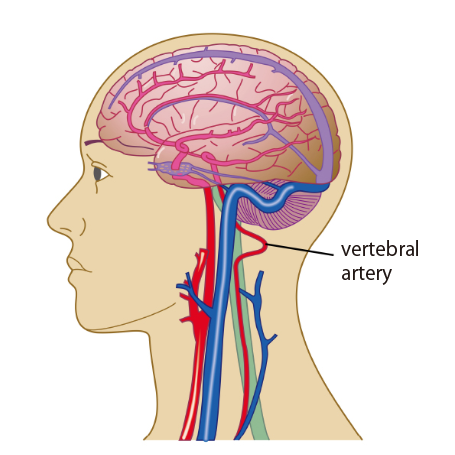
In everyday life, dizziness is usually less likely to occur than a headache or stomachache.
You may be able to easily determine the severity of your headache or stomachache because you might experience them more frequently as compared to a dizziness. When you experience dizziness for the first time, you might feel nervous and think the symptom more severe than it actually is. When that happens, you might think of getting medical attention immediately and may rush to one of the largest hospitals to receive urgent care. However, more than 90% of the dizziness is usually not a sign of anything serious. You should wait until your symptom disappears and then visit a specialist so they can help provide you with a more accurate diagnosis/treatment.
There seems to be many medical specialists who are not familiar with diagnosing dizziness. Wrong diagnosis and treatment do not help a dizziness sufferer get better. What do you need to know in order to avoid improper diagnosis?
In this article, neurologist Dr. Yoshiya Hasegawa, who sees many patients suffering from dizziness, provides useful information about dizziness disorders.
Contents
1. When does dizziness happen most?
Patients who complain of dizziness are basically grouped into three clusters as described in the following subsections.
Various terms are commonly used when patients describe their dizziness: floating; unsteadiness; a loss of balance; or a sensation of spinning.
1-1. Upon waking up
Dizziness mostly occurs when you wake up in the morning. Therefore, you should avoid jumping out of bed quickly. It is better to sit up slowly and take a little time to stretch.
1-2. When you wake up at night to visit the bathroom
Dizziness often occurs when you need to visit the bathroom after falling asleep. Getting up suddenly from a reclining position often triggers a dizziness. This is especially so when you are sleeping on a floor, as it creates a large vertical movement of your head when you stand up, and this sudden change in position often causes dizziness. I recommend sleeping on the bed with a high bed base in order to prevent this type of dizziness.
1-3. When you look down or look back
Your neck movement may be one of the triggers in dizziness; such as looking down or looking back. Also, the reclining position of your head when your hair is being shampooed over the sink at a hair salon sometimes causes dizziness.
2. Select a specialist depending on your symptom
The first thing you need to do when you feel dizzy is to rest and observe yourself. Then you should check if you have hearing impairments such as “tinnitus (ringing in the ears),” “aural fullness (stuffy ears),” or “hearing loss.” You need to determine your symptoms carefully in order to select an appropriate doctor to visit.
2-1. Otolaryngology (ENT)
You possibly have otolaryngological problems if you have ringing in your ears, hearing loss or stuffy ears. When you experience dizziness symptoms for the first time, you may feel too anxious to make a correct judgement. Try a self-test to check your hearing by snapping your finger right behind your ears. Some people do not notice that they have lost their hearing until performing a self-check.
Generally, patients with dizziness caused by ear or nose-related problems often complain of vertigo where they feel that their surroundings are spinning. Typical diseases accompanied by vertigo symptoms are as follows.
- Benign paroxysmal positional vertigo (BPPV): Vertigo is caused when otoliths that are normally in the vestibule of the inner ear break free and enter the semicircular canals. Usually, moving your head in a certain direction triggers vertigo.
- Meniere’s disease: Other than triggering vertigo which is a typical symptom of dizziness caused by inner ear problems, Meniere’s disease also affects hearings. Dizziness caused by Meniere’s disease usually lasts more than 20 minutes and continues even while you are lying down. This attack may also trigger nausea.
- Vestibular neuritis: Viral or bacterial infection such as a common cold or flu sometimes causes the vestibular nerve to become inflamed disrupting your sense of balance and leads to dizziness.
- Sudden Sensorineural Hearing Loss (SSHL): It is caused by inflammation to the auditory nerves such as Otitis Media, or middle ear infection. SSHL may triggers vertigo, however the dizziness symptom tends to be less severe than hearing loss.
2-2. Neurology
Visit a neurology specialist if you have a dizziness and are unsure whether you have a problem in the ear or not. Examinations will be administered to identify if it is attributable to a problem in the brain or other parts except the ears. You might feel very nervous when you find out that your dizziness is caused by a brain problem. However, more than 90% of outpatients who suffer from dizziness caused by a brain problem are not in critical condition.
Cerebral ischemia or brain ischemia is the most common cause of dizziness among those who visit neurologists. There are four blood vessels running towards the brain, and these are found one on each side, at the front and back of the neck. Two vessels in the back of the neck are called vertebral arteries which proceed superiorly in the transverse foramen of each cervical vertebra. These vessels tend to be compressed when you move your neck and may lead to dizziness.

Poor circulation of the vertebral artery in cervical vertebra may cause dizziness.
A neck X-ray is often ordered as well as a head CT and MRI to examine the cause of dizziness at the neurology. Many patients may wonder why a “neck X-ray” is necessary to examine dizziness. This is because a neck X-ray is helpful to find out if there are any cervical spine deformities which often trigger dizziness.
The situations in which dizziness is more likely to occur as I had mentioned earlier: upon waking up; when you wake up to visit the bathroom at night; and when you look down or look back; are often associated with neck movement.
2-3. Diagnosis from non-specialists might be inaccurate
Personally, there seem to be many doctors who are not familiar with diagnosing dizziness, and many patients with dizziness often end up getting diagnosed with “Meniere’s disease” when they visit non-specialists. This diagnosis may be incorrect if the doctors are unfamiliar with “Meniere’s disease.”
Symptoms of a Meniere’s disease attack include “recurring episodes of dizziness accompanied with symptoms such as hearing loss, tinnitus, or feeling of fullness in the ear.” The critical factor in diagnosing Meniere’s disease is if it accompanies “signs or symptoms that may affect one’s ears.” If one experiences only dizziness, Meniere’s disease is ruled out.
When you are asked by the doctor about having experienced any signs or symptoms which affect your ears such as tinnitus, feeling of fullness in the ear or hearing loss, chances of you getting a correct diagnosis is higher because the doctor shows a deeper understanding of dizziness instead of immediately diagnosing it as “Meniere’s disease” without checking for ear problems.
3. Dizziness which requires an emergency attention
More than 90% of dizziness are not critical and it is not too late to visit an otolaryngology (ENT) or neurology after the symptoms disappear. However, if you experience certain symptoms listed below, it may be a stroke or intracerebral hemorrhage and immediate medical attention should be sought.
- Slurred speech or dysarthria
- Severe headache
- Numbness or weakness
4. Dizziness which are not caused by ENT or neurological problems
When I examine outpatients who suffer from dizziness, their symptoms are sometimes not attributable to ENT or neurological problems. Even a complete examination at the ENT & neurology clinic cannot identify the cause and dizziness remains. I will list here other possible causes.
4-1. Anemia
Sometimes a blood sample shows an iron-deficiency anemia. This can be improved by taking iron supplements.
4-2. Fainting / syncope
You may experience a symptom called “dimmed vision” where your vision suddenly goes black and you might become unconscious or pass out if it worsens.
People may be shocked when you suddenly faint but you can be revived when you lie down for a while, preferably in a position where your head is kept low. If you do not regain consciousness or if you feel a pain in your chest, urgent medical care is required.
| Fainting in a small space
Some elderly people may faint while sitting on a toilet seat. To help them recover, lay them immediately on a floor if there is enough room. However, in a small space like a toilet cubicle, they can do nothing other than sit unconscious in the toilet. It is usually temporary and they can be revived in a few minutes. Nonetheless, close monitoring will be required. |
4-3. Stiff shoulders
I frequently find that many patients with stiff shoulders suffer from dizziness. They tend to be busy, sleep-deprived, fatigued or lacking in exercises which often leads to a higher physical/psychological tension. This type of physical condition may cause chronic lightheadedness or dizziness and medical examinations will not show any particular cause.
In such cases, doctors need to explain that sufferers are “not sick” and try to alleviate their anxiety, encourage them to get rest and do some exercises. This will usually help improve their symptoms.
5. Treatments
You should see a specialist when your dizziness stays even after observing for a while. Following treatments will be administered.
5-1. Intravenous injection or intravenous drip infusion of 7% sodium bicarbonate solution
This agent controls dizziness by increasing blood flow of the inner ears and preventing a decrease in partial pressure of oxygen during ischemia of the inner ear. However, it does not improve the symptoms right after injection but gradually over time.
5-2. Metoclopramide intravenous injection
Metoclopramide intravenous injection will be administered to achieve an antiemetic effect for someone who is unable to take oral medication due to acute nausea.
5-3. Intramuscular injection of anti-anxiety agent
Intramuscular injection with an anti-anxiety agent such as Diazepam is administered to acute dizziness sufferers with severe anxiety. Anti-anxiety agent may help reduce dizziness by facilitating the initial stage of vestibular compensation mechanism, a function of the brain which controls body balance and equilibrium when one feels dizzy.
5-4. Prevention
Dizziness can be prevented by improving one’s lifestyle.
6. Lead a well-balanced life
Disturbance in lifestyle may trigger dizziness. You might consider looking into your sleeping habit or diet when you start experiencing dizziness.
7. Beware of neck movement
Dizziness is often triggered by neck movement and if you avoid sudden change, frequency of dizziness should decrease. Sleeping on a bed is also less likely to cause dizziness than sleeping on a floor.
8. Avoid chiropractic
Stiff shoulders or stress may be the one of the common causes of dizziness. Massage, acupuncture or yoga may improve dizziness symptoms. Personally, it might help to avoid chiropractic because certain stimulation to the neck may sometimes trigger dizziness.
9. Summary
- You should check if you have hearing impairments such as tinnitus, aural fullness, or hearing loss when you experience dizziness.
- You may want to visit a neurologist or an ENT if you have hearing impairments.
- You need urgent medical care when you experience slurred speech or dysarthria, severe headache or numbness.
- Massage, acupuncture or yoga might help to decrease dizziness attacks. In my personal opinion, I would prefer to avoid chiropractic for the above reason shared.

